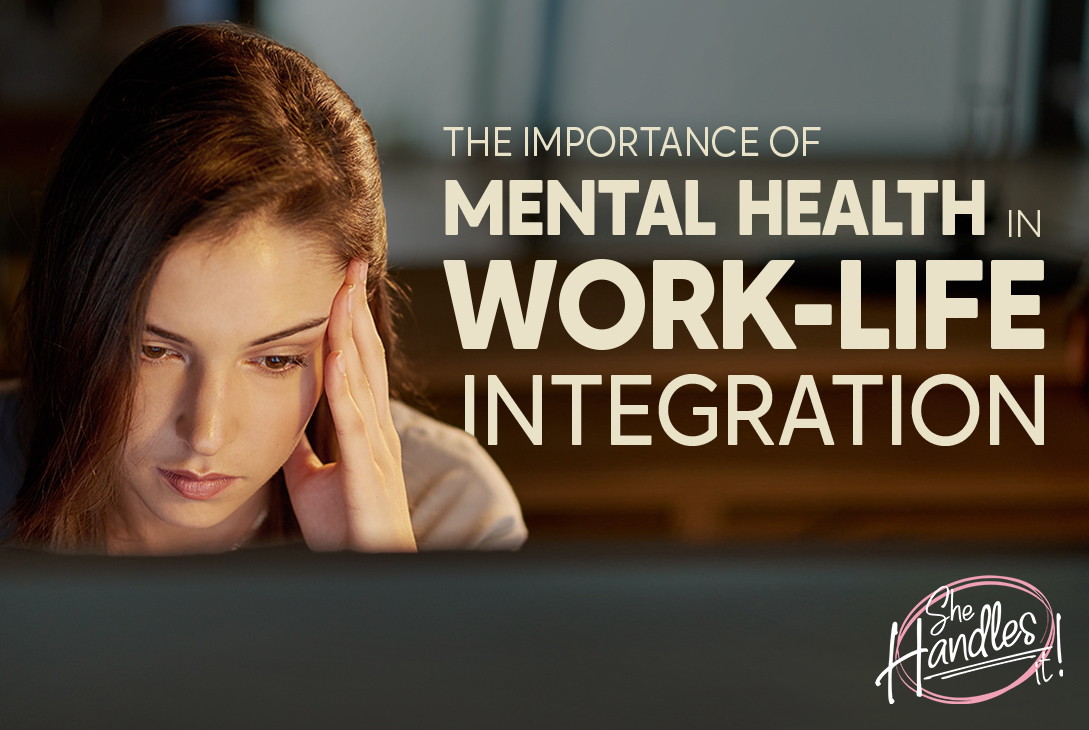In today’s fast-paced world, the pressure to excel in both professional and personal arenas can be overwhelming.
As we strive to integrate work and life more seamlessly, one aspect that often gets overlooked is our mental health. Yet, it’s one of the most critical factors in achieving true work-life integration.
At SheHandlesIt.com, I’ve shared my journey toward finding harmony in the hustle, and one recurring theme is the need to prioritize mental health as a cornerstone of successful work-life integration.
Let’s delve into why mental health is so essential and how we can protect it while balancing the demands of modern life.
Understanding the Connection Between Mental Health and Integration
Work-life integration is about blending the various aspects of our lives—work, family, self-care—into a cohesive whole. However, when mental health isn’t prioritized, this integration becomes difficult, if not impossible. Stress, anxiety, and burnout can quickly derail our efforts to live a balanced and fulfilling life.
In “Why Work-Life Integration Beats Balance Every Time“, I discussed how integration allows for flexibility and adaptability. This flexibility is crucial for maintaining mental well-being, as it lets us adjust our schedules and responsibilities based on our emotional and psychological needs. By recognizing the interdependence between mental health and integration, we can create a more sustainable approach to managing our lives.
The Impact of Stress and Burnout
Stress is an inevitable part of life, but when it becomes chronic, it can take a severe toll on our mental and physical health.
Burnout, a state of emotional, physical, and mental exhaustion caused by prolonged stress, is increasingly common, particularly among high-achieving professionals and working mothers.
As I’ve highlighted in “Finding Harmony in the Hustle”, the key to successful integration lies in recognizing when stress is taking over and taking steps to address it before it leads to burnout. This might involve setting boundaries, seeking support, or simply allowing yourself time to rest and recharge.
Integrating Self-Care into Daily Life
One of the most effective ways to protect your mental health is by integrating self-care into your daily routine. Self-care isn’t just about bubble baths and spa days (though those are nice!); it’s about making time for activities that nourish your mind, body, and soul.
Incorporating self-care into your work-life integration plan might involve small, daily practices like morning meditation, regular exercise, or setting aside time to connect with loved ones. These practices help build resilience, making it easier to navigate the challenges of work and life without sacrificing your mental health.
Technology can support this process. For example, wellness apps can guide you through mindfulness exercises, while fitness trackers can remind you to move and stay active throughout the day.
These tools can be powerful allies in maintaining your mental health as you juggle work and personal responsibilities.
Creating a Supportive Environment
Mental health thrives in environments where support and understanding are abundant. Whether it’s at work, home, or within your community, creating and maintaining a supportive network is crucial.
This includes open communication with your employer about your needs and boundaries, as well as cultivating relationships with friends, family, and colleagues who uplift and encourage you.
The shift to remote work has made it more challenging to maintain these boundaries, but it also presents an opportunity to redefine them in ways that protect your mental well-being.
For instance, setting up a designated workspace at home can help you mentally separate work from personal time, reducing stress and promoting a healthier work-life balance.
The Role of Reflection and Mindfulness
Mindfulness and reflection are powerful tools for maintaining mental health. They help us stay present, reduce anxiety, and make more thoughtful decisions about how we spend our time and energy. Incorporating mindfulness practices into your daily routine can enhance your ability to integrate work and life effectively.
Incorporating regular moments of reflection—whether through journaling, meditation, or simply taking a few minutes each day to breathe and center yourself—can help you stay connected to your mental and emotional state.
This awareness allows you to make adjustments as needed, ensuring that your work-life integration plan remains sustainable and supportive of your overall well-being.
Seeking Professional Help When Needed
Despite our best efforts, there are times when stress and anxiety can become overwhelming. In these moments, seeking professional help is a vital step in protecting your mental health. Therapy, counseling, or coaching can provide the support and tools you need to navigate challenges and regain your equilibrium.
As I’ve emphasized throughout my blogs, work-life integration is not about doing it all on your own. It’s about knowing when to seek help and using the resources available to you to create a life that feels balanced and fulfilling. Mental health professionals can be an essential part of this support system, helping you manage stress and prevent burnout.
Prioritizing Mental Health in Work-Life Integration
Mental health is not just a component of work-life integration—it’s the foundation upon which everything else is built. Without a strong mental and emotional foundation, our efforts to integrate work and life can quickly unravel.
We may build a life that is enjoyable, sustainable, and productive by making mental health a priority.
Remember, true work-life integration requires us to be mindful of our mental health, to practice self-care, and to seek support when needed.
As you continue on your journey toward work-life integration, let mental health be your guide, helping you navigate the challenges and celebrate the victories along the way.
Last modified: September 9, 2024










